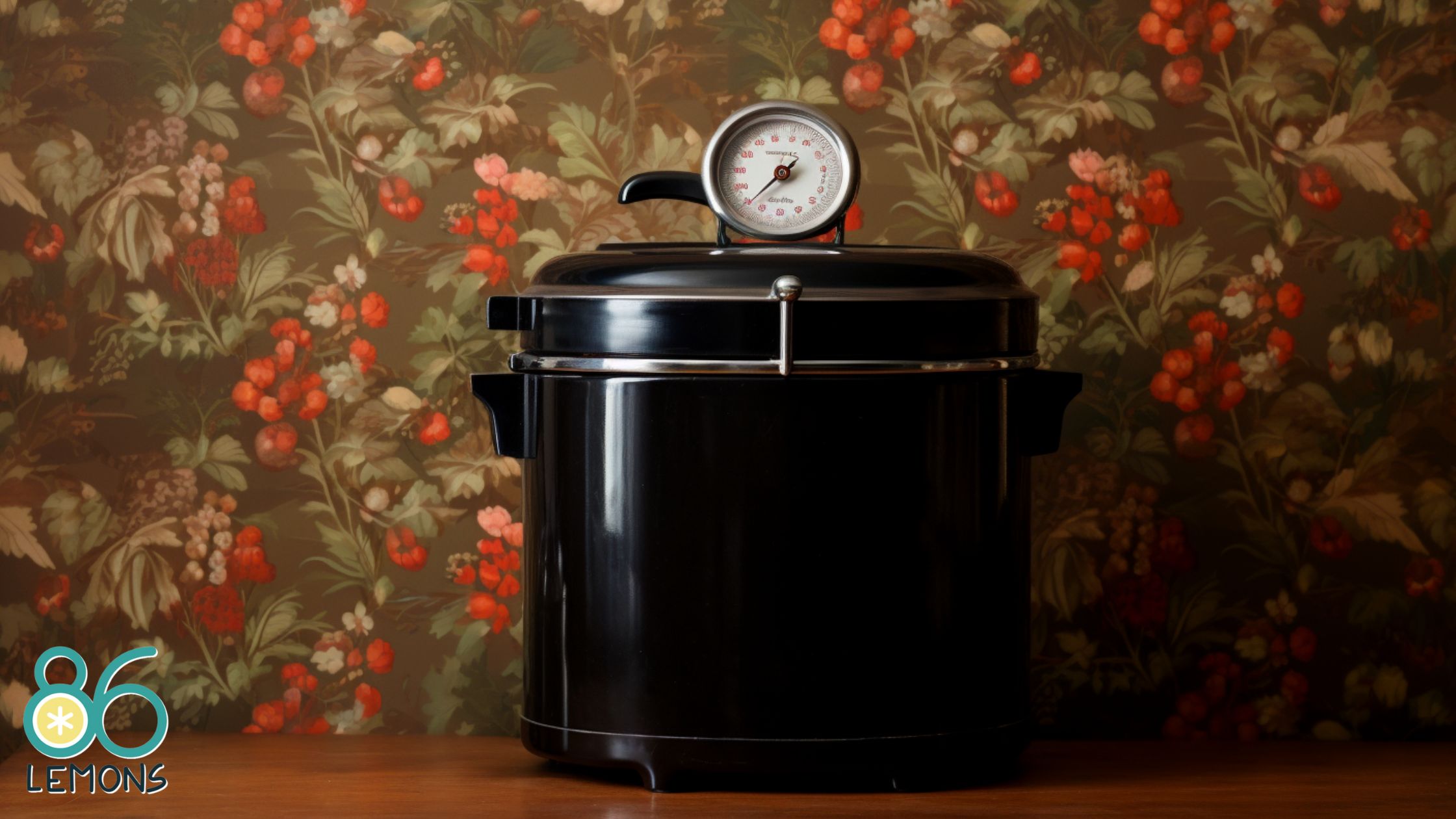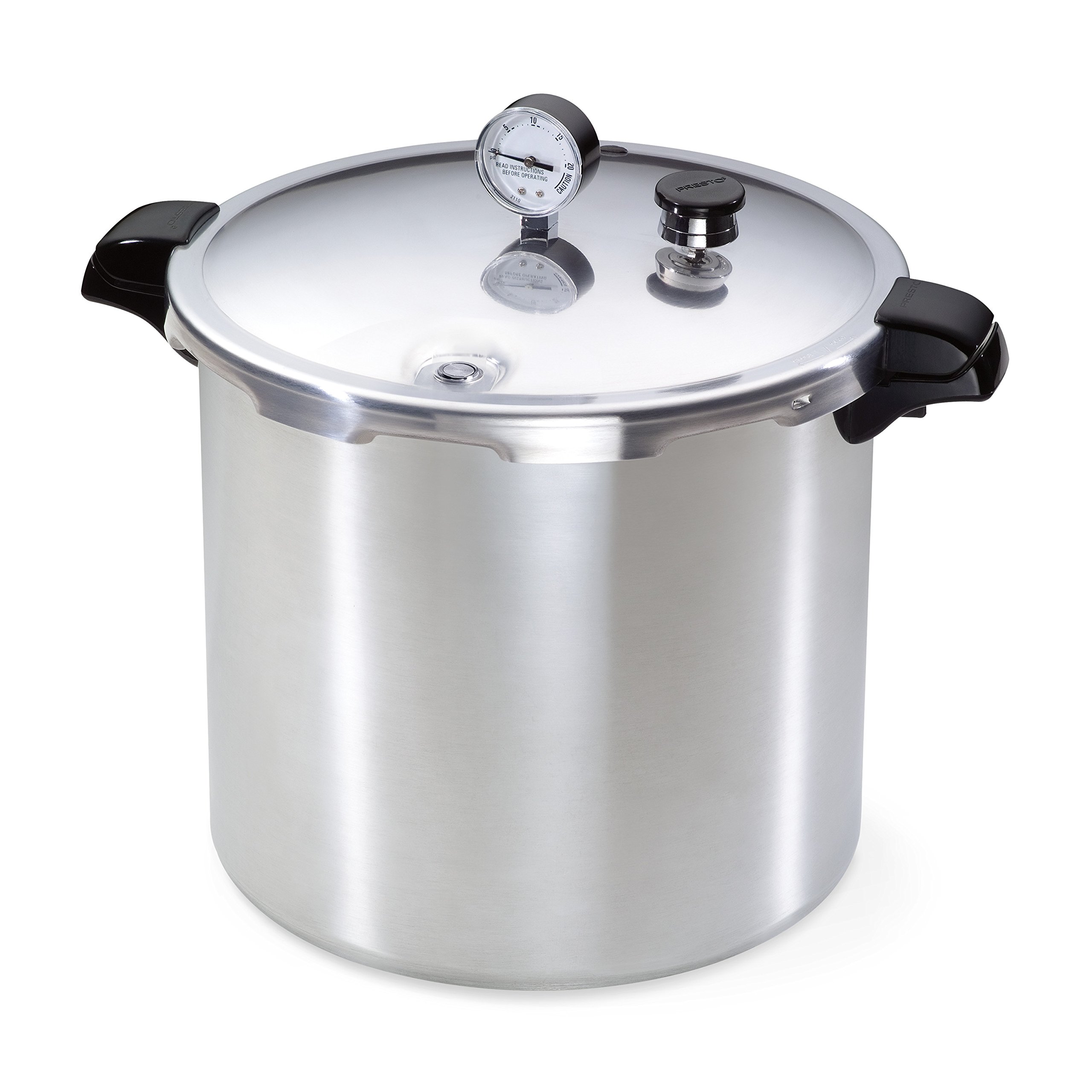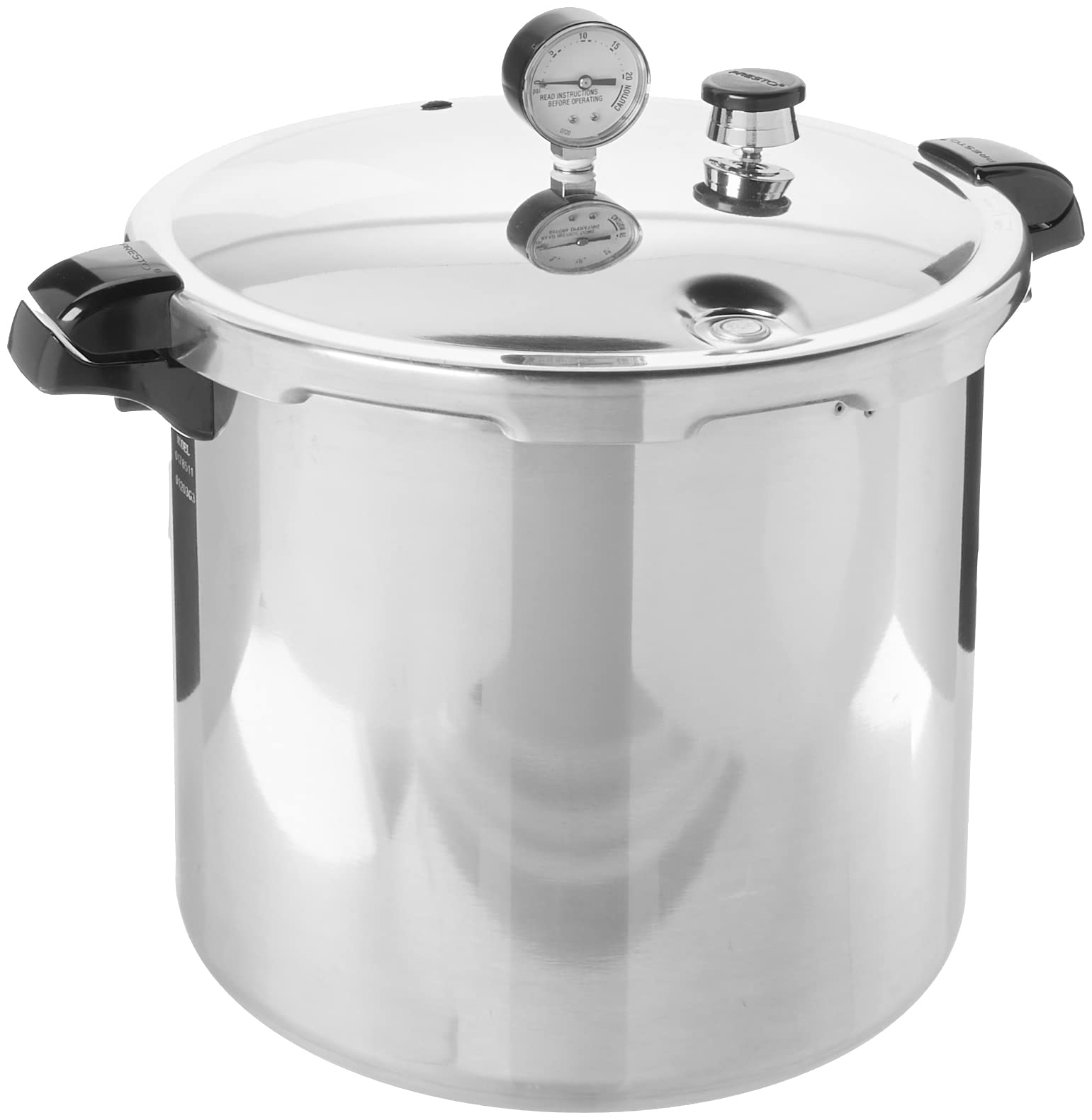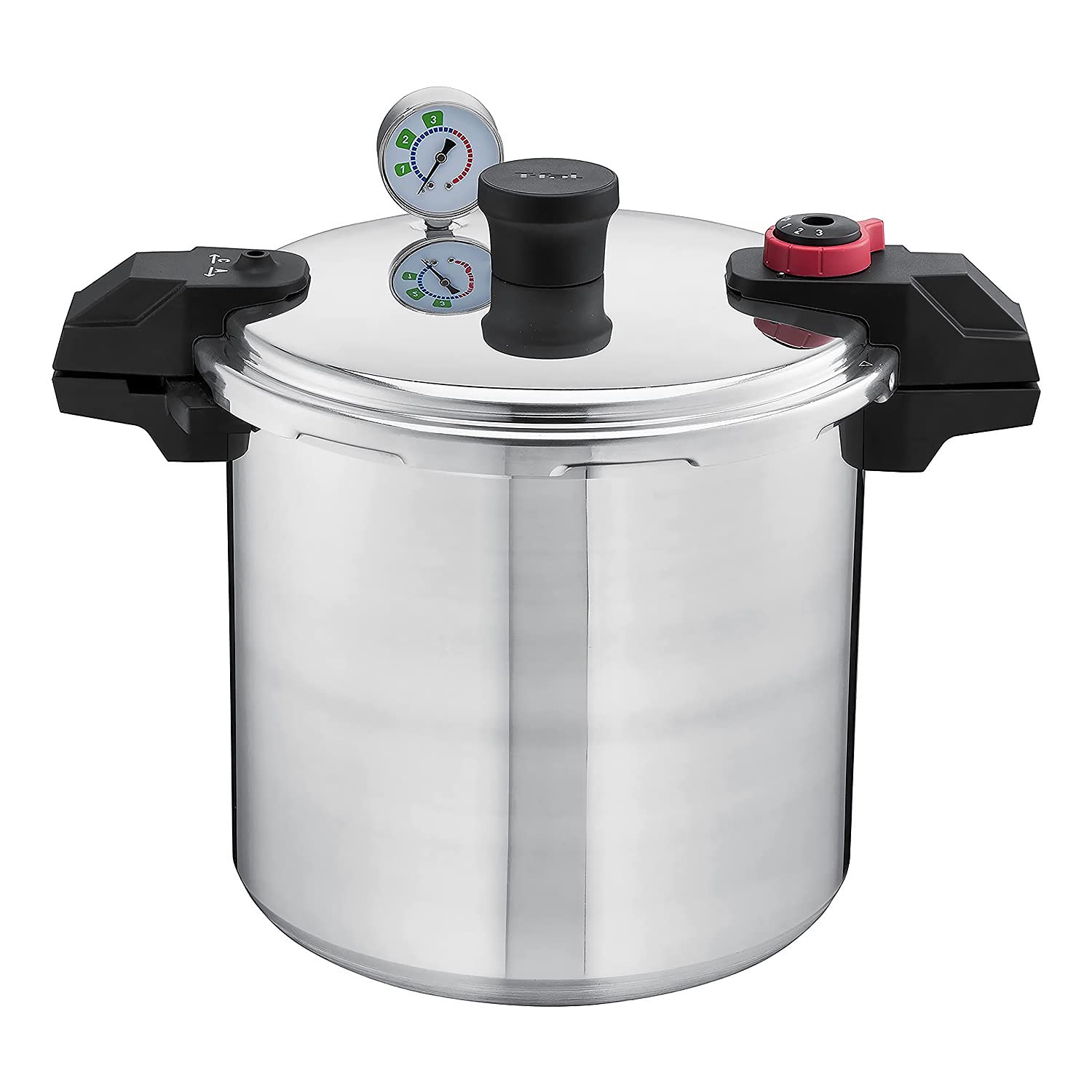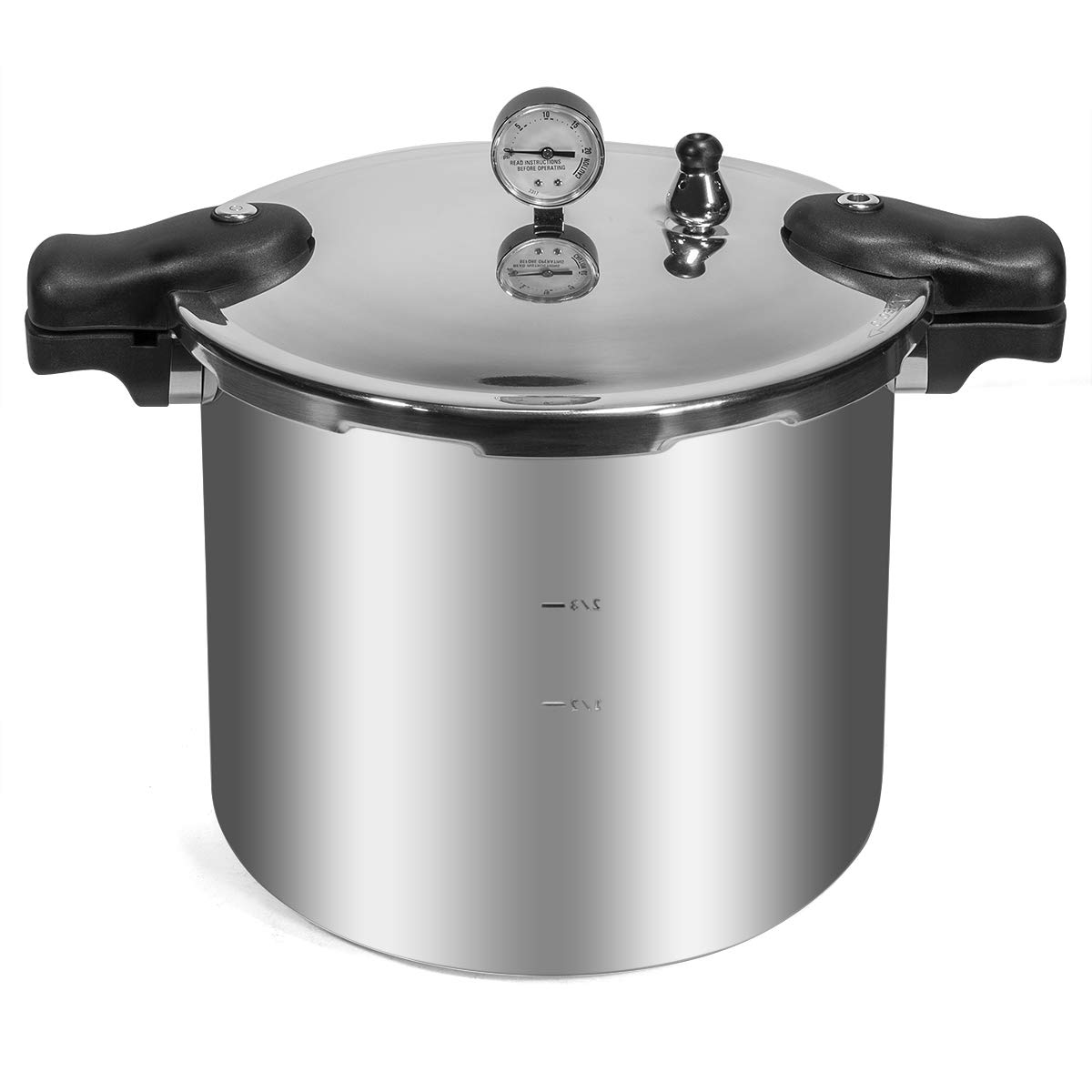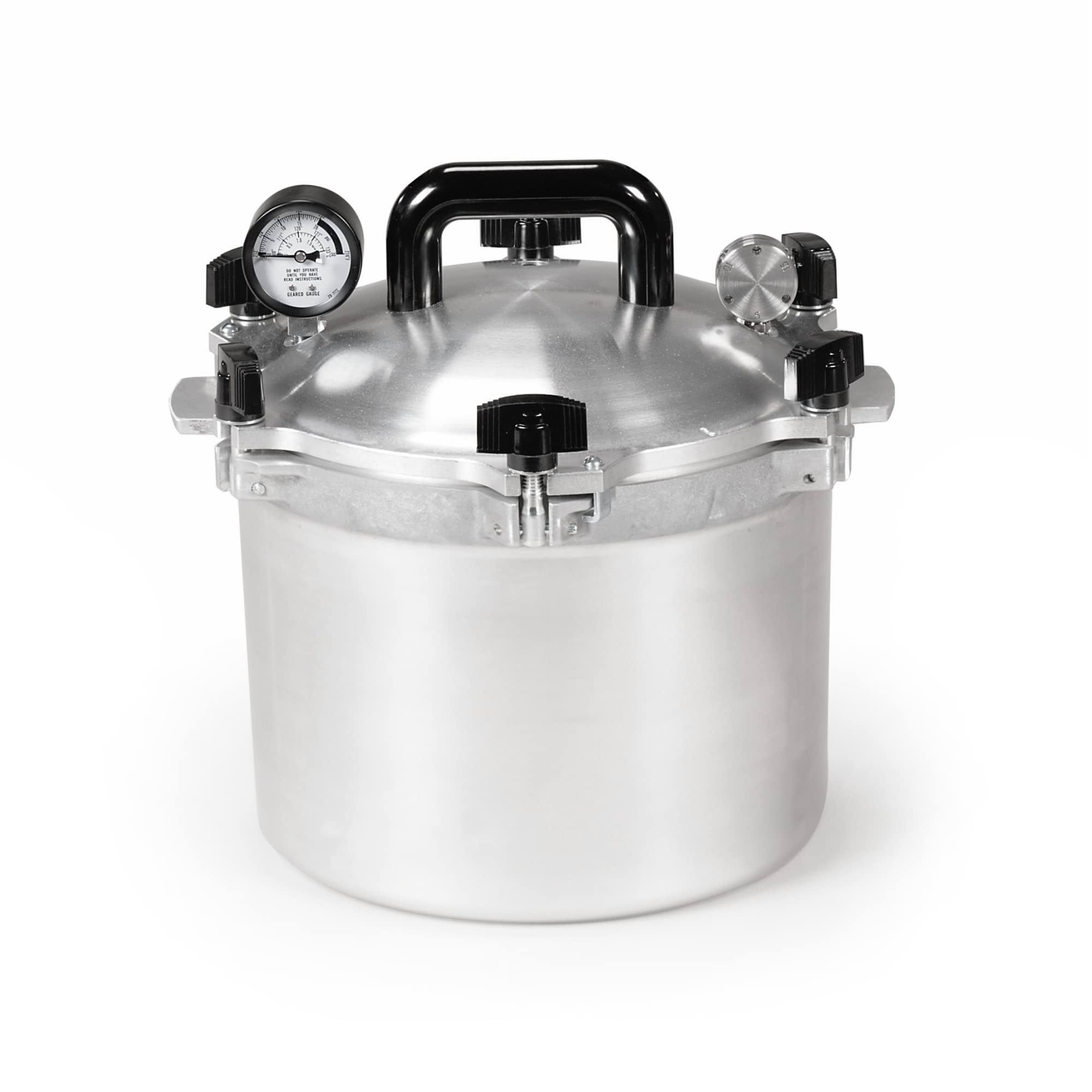Canning is an age-old method of food preservation that has seen a resurgence in popularity among home cooks and hobbyists looking to stock up on homemade soups, preserves, and other pantry staples. This technique involves sealing food in jars or cans and heating them to a temperature that kills harmful bacteria and enzymes, ensuring the food remains safe and retains its flavor over a long period.
A pressure cooker for canning is particularly effective for this purpose, as it reaches higher temperatures than boiling water canners and can safely preserve low-acid foods like meats, vegetables, and seafood. Choosing the best pressure canner is essential for safety and ease of use.
A pressure canner is a heavy-duty piece of equipment designed to withstand high pressure and temperature. It typically comes with a locking lid, a pressure gauge or regulator, and a rack to hold jars off the bottom of the pot.
Materials and construction are critical, with durable aluminum or stainless steel being the most common. The size is also crucial; capacities range from smaller models, which are great for beginners or those with limited storage space, to larger units that can process more jars in one batch.
Features such as pressure gauges, vent ports, and safety locks are integral to the functioning and safety of a pressure canner. A well-designed gauge is key to maintaining the correct pressure, whereas a vent lock ensures that the lid cannot be opened while the contents are under pressure, preventing accidents.
I’ve put my kitchen gloves on, scrolled through mountains of reviews, and even tested some of the leading models on the market to help you find a pressure canner that suits your needs and budget. Whether you’re a seasoned canner or just getting started, the right pressure canner can make all the difference in your food preservation endeavors.
Best Pressure Canners for Your Kitchen
I’ve searched high and low to bring you our top picks for pressure canners that easily handle your preservation needs. Let’s dive into the list of products that will help you can with confidence.
Presto Pressure Canner
I believe the Presto Pressure Canner is a top-tier choice for ensuring safe, efficient canning, and versatile cooking experiences at home.
Pros
- Ensures a high level of safety with its pressure dial gauge and overpressure plug
- Performs as an all-in-one device for canning and cooking, maximizing kitchen space
- Sturdy build promises longevity and comes with an impressive 12-year warranty
Cons
- Non-immersible lid means you’ll need a bit of patience with cleaning
- The aluminum construction requires non-abrasive cleaners only, so you’ll need to be gentle
- The size is quite large, which may be a storage challenge for some
I’ve been rocking my kitchen with the Presto Pressure Canner recently, and I’m impressed. The safety features are top-notch, with the pressure dial gauge providing peace of mind that I’m canning at appropriate pressures.
The 12-year warranty is no joke either. The lid requires special care during cleaning because it can’t be dunked in water, but the extra effort is worth the performance. Having to use only non-abrasive cleaners for this one means I’m extra gentle.
The only real hiccup I’ve encountered is the canner’s size when tucking it away. Those with limited storage space might need to get creative. Nevertheless, when you’re handling big batches of goods, the size is a benefit.
Presto Pressure Canner
If you’re ready to up your home canning game, this canner is a solid winner with its versatility and large capacity.
Pros
- Effortless to handle on various stove types
- Sizable capacity for big batch processing
- Simple to operate, even for newcomers
Cons
- Hefty unit that requires ample storage space
- Can scratch glass stove tops if not handled with care
- Learning curve to perfect the pressure canning process
I’ve been getting serious about preserving our garden’s bounty and turned to this Presto Pressure Canner. I was immediately impressed by its ability to double as a water canner – it’s like getting two tools in one.
Operating on our induction cooktop and the old gas range at the cabin has been hassle-free. Its hefty build is a testament to durability, though I had to clear a permanent spot in the pantry for storage — it’s not a gadget you tuck away easily.
But let’s get real here; it’s an investment in money and space. I had to practice with water batches at first to get a handle on the nuances of pressure canning. Also, caution is key to avoid scratching the stovetop.
T-fal Deluxe Canner
If you’re considering stepping up your home canning game, I recommend this T-fal model for its robust features and performance.
Pros
- Impressive heat distribution, making canning a breeze
- Secure locking system puts our mind at ease
- Large capacity is perfect for big-batch processing
Cons
- It’s a bit hefty, could be a challenge to store
- The manual’s not the best, left us wanting clearer guidance
- Its size might be overwhelming for beginners
Recently, I’ve been putting the T-fal Pressure Cooker Aluminum Pressure Canner through its paces, and it’s fair to say we’ve been impressed. The even heating it offers is noticeable, and it’s been a massive help in maintaining precise temperatures.
The peace of mind the secure locking mechanism provides cannot be overstated, and its generous 22-quart capacity sets it apart. I particularly love the addition of two cooking racks, which make organizing jars a cinch.
On the downside, finding the perfect spot to store this sizeable canner can be tricky. Additionally, getting familiar with its features took longer than expected due to the manual’s shortcomings.
Barton Pressure Canner
This canner’s a solid pick if you’re into preserving your plant-based harvests.
Pros
- Effortlessly handles large batches of veggies and fruits
- Clear pressure gauge for high-altitude adjustments
- Safety features provide peace of mind
Cons
- Bit on the hefty side, challenging to maneuver
- Manual’s a tad sparse on details
- Finding spare parts might be tricky
Using the Barton Pressure Canner has genuinely streamlined my canning sessions. Its large capacity allows me to handle numerous jars in one go. The polished aluminum design isn’t just sleek; it’s durable, too, and I’ve noticed no trouble with rust.
With it being compatible with an induction cooktop, it didn’t have any hiccups when switching from gas. The gauge on this canner is also quite the gem, allowing me to get accurate pressure readings.
I’ve always been keen on safety; the Barton doesn’t skimp there. The safety lock and spring device ensure that pressure only builds when the canner is securely closed and won’t open when pressurized.
All American 1930 Pressure Canner
If you’re eager to preserve a variety of foods safely and efficiently, this pressure canner is an excellent investment.
Pros
- Flawless sealing without the need for gaskets
- Constructed to endure heavy use
- Features a straightforward steam gauge for monitoring
Cons
- Can be heavy when full
- Takes up a significant amount of storage space
- The initial learning curve for new canners
Using the All American 1930 Pressure Canner feels like entrusting your canning to a reliable partner. Its heavy-duty construction has not let us down. The metal-to-metal seal, unique to this model, means there’s no hassle with gasket replacements.
I’ve noticed how food retains its taste and nutrition when canned correctly—a testament to the canner’s ability to reach higher temperatures. The large capacity has come in handy, allowing us to can in bigger batches and save time.
It’s not as lightweight as some other options, so moving it around when it’s full could be challenging for some. But it’s a minor inconvenience considering its durable design that I know will last for years.
READ NEXT: Best Stovetop Pressure Cooker: Ultimate Picks for Easy, Fast Dinners
Buying Guide
Key Features to Consider
When I’m out hunting for the perfect pressure canner, I must eye a few key features. Let’s break them down!
- Capacity: How much you plan to do at a time will guide your choice. Pressure canners come in various sizes, so pick one that suits your batch size.
- Material: Typically, I find aluminum and stainless steel models. Aluminum is lighter and heats up quickly, while stainless steel is more durable and warp-resistant.
- Gauge Type:
- Dial Gauge: Needs to be calibrated regularly but is easy to read.
- Weighted Gauge: Low maintenance, but can be noisier.
Safety Features
Safety can never be compromised. Scrutinize pressure canners for:
- Safety Valves: Overpressure release is a must-have to keep us safe.
- Locking Lid: Prevents the lid from being opened while under pressure.
Usability
Ease of use matters a lot. I’m looking for:
- Handles: Should be sturdy and stay cool.
- Pressure Settings: Multiple pressure options offer more flexibility.
Maintenance
Being easy to clean should be on our checklist to ensure longevity without too much hassle.
Price
You want a canner that provides value for our hard-earned money without skimping on essential features.
You should also think about the manufacturer’s reputation for quality and customer service in case you need support. Choosing the best pressure canner balances these features with our specific needs. Happy canning!
Frequently Asked Questions
When we’re on the hunt for the best pressure canner, some questions pop up more often than others. Let’s tackle these head-on to help us all make informed decisions.
What should a beginner look for in a quality pressure canner?
As a beginner, you want to look for a pressure canner that’s easy to use, with clear instructions and features for safe canning. A model with a straightforward gauge, durable construction, and a size that suits our canning ambitions is ideal.
Are there special pressure canners recommended for use on glass top stoves?
Yes, for glass top stoves you need to be careful. You need to choose a canner that’s not too heavy, sports a flat bottom, and distributes heat evenly to prevent damage to our stove. It’s crucial to consult the stove’s manual to ensure compatibility.
What are the features that determine a good pressure canner for its price?
To determine a good pressure canner for its price, one should consider build quality, safety features, canning capacity, ease of cleaning, and whether it comes with a warranty. A canner with a heavy-duty gauge and a robust, non-reactive construction usually offers the best value.
Which pressure canners come with USDA approval?
Pressure canners that comply with the USDA’s recommended standards is my go-to for safe home canning. Look for products that explicitly state they meet or exceed these guidelines to ensure the quality of your canned goods.
What are the key differences between stovetop and electric pressure canners?
Stovetop pressure canners are usually more versatile since they can be used on various heat sources, while electric models offer convenience with their set-and-forget features. The electric ones often include digital controls and timers, which are handy for multitasking.
What essential information do I need to understand before investing in a pressure canner?
You need to know the types of foods you plan to can, the quantity, and how frequently you’ll use the canner. Understanding the pressure canning process and familiarizing ourselves with the maintenance and storage of the canner is also critical before taking the plunge.

